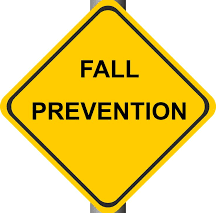June is National Home Safety Month and a good time to ensure that your home, as well as those of the older adults in your family, are safe. The National Safety Council offers some statistics about older-adult falls – and some solutions for keeping loved ones safe.
Americans are living longer while staying active and healthy. But adults 65 and older are at risk for falls, which can signal the beginning of the end of that active life – and their independence. Injuries from a fall can lead to limited activity, reduced mobility, loss of fitness and a fear of falling, all of which increase the risk of additional injury.
According to the Centers for Disease Control and Prevention:
- One in three older adults fall each year
- More than 250,000 hip fractures are reported every year, and 95 percent of those are from falls
Some of the underlying causes of older-adult falls, such as muscle weakness, medications that cause dizziness, improper footwear, impaired vision, slick floors, poor lighting, loose rugs, clutter and uneven surfaces, can be improved.
While accidents can happen anywhere, they most often occur at home.
What can you do to make your home or the home of someone you love safer?
- Remove clutter, small furniture, pet gear, electrical cords, throw rugs and anything else that might cause someone to trip
- Arrange or remove furniture so there is plenty of room for walking
- Secure carpets to the floor
- Wipe up spills immediately
- Make sure outdoor areas are well lit and walkways are smooth and free from ice
- Use non-slip adhesive strips on stairs
- Use non-skid mats or appliques in the bath and shower
- Install grab bars in the tub, shower and near the toilet
- Install railings on both sides of stairs
- Provide adequate lighting in every room and stairway
- Place nightlights in kitchen, bath and hallways
- Make often-used items more accessible so older loved ones won’t need to use a stool or ladder
- If necessary, provide personal walking devices, such as a cane or walker, to aid in stability
Harvard Medical School touts the value of exercise in preventing falls and even reversing some of the many conditions associated with aging. In addition to regular exercise, older adults should ask a doctor if their medications may be causing dizziness, and make sure to have regular eye exams.
Source: National Safety Council and Center for Disease Control


